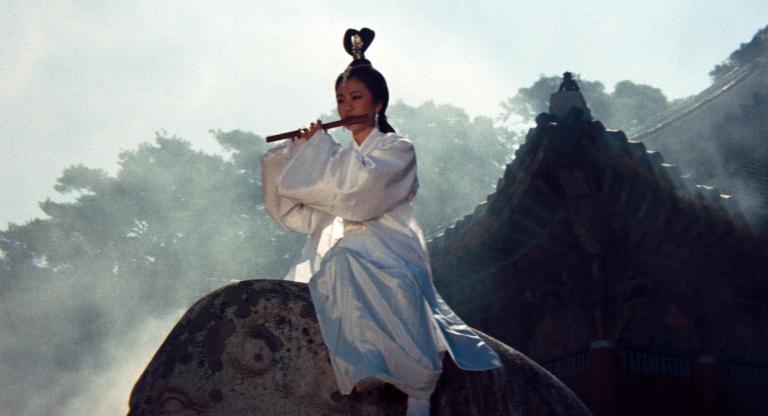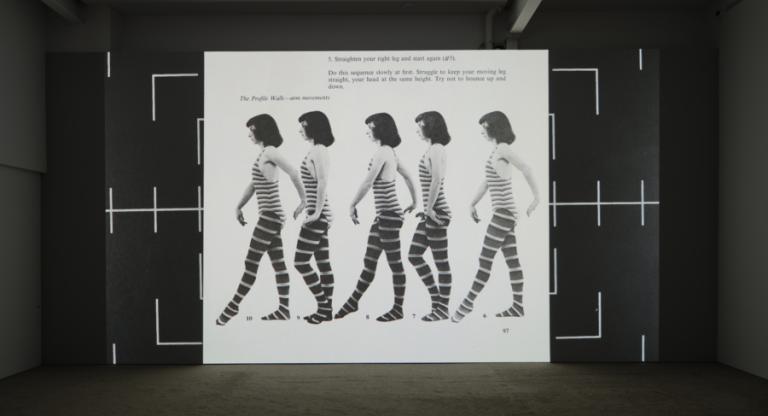
This year’s Old School Kung Fu Fest is dedicated to a man who could be the patron saint of the series, Taiwanese triple threat Joseph Kuo. He’s simultaneously more and less familiar to American audiences than other action directors—the name won’t ring a bell like King Hu or Chang Cheh, but Kuo’s films were staples of the grindhouse circuit, and thanks to Wu-Tang Clan, even the film-averse probably know his Ghost-Faced Killer and Mystery of Chess Boxing.
The retrospective includes five films screening at the Museum of the Moving Image: 18 Bronzemen (1976), Return of 18 Bronzemen (1976), 7 Grandmasters (1977), Mystery Of Chess Boxing (1979), and 36 Deadly Styles (1979). An online extension includes four more restored films, Shaolin Kung Fu (1974), Shaolin Kids (1975), World of the Drunken Master (1979), and the juiciest oddball of the entire bunch, The Old Master (1979). “This [series] is the brainchild of Subway Cinema co-founder Goran Topalovic,” says Grady Hendrix, Subway Cinema co-founder and author par excellence, who was kind enough to correspond with me. “He’s been working for years to make it happen. We wanted to do this right so we had to find sources, pay for restorations, get subtitles done, and find the money for all of it. It finally looked like it was going to happen in the spring of 2020 and then, well, you know the rest.”
Except for a brief early stint with Shaw Brothers, Kuo was a highly successful independent artist for over three decades, writing, directing, and producing under his own Hong Hwa International Films production company. His style varied to suit each film, but in shooting action he bridged eras, combining Lau Kar-Leung’s wide-shot respect for physical technique with the ’80s Hong Kong style of cutting on movement for maximum impact. Skimpy budgets were opportunities to innovate new ways of shooting guys fighting in a sunny field, and Kuo’s rotating stable of charismatic actors, including intense Carter Wong, sweetly goofy Yi-Min Lee, and bold, athletic Polly Shang-kuan, added value where money wasn’t.
Ever a populist, Kuo followed shifting audience tastes from ’60s historical epics to ’70s “angry young man” films, even throwing disco into the mix. “Kuo was tremendously adaptable,” says Hendrix. “When Shaolin got popular he added to the mythos with his Bronzemen movies; when kung fu comedy came into vogue he jumped in with World of the Drunken Master and Mystery of Chess Boxing. Through all of that, the style I see staying the same are the complicated story structures packed with flashbacks and sudden jumps to parallel characters, hidden identities, everyone revealing they’re related to everyone else, and deeply bleak endings where the wages of revenge turn out to be death and no one can escape their fate.”
The last holds true even for World of the Drunken Master which, despite the slapstick-heavy acrobatics and silly frenemies plot, adds unrequited love and the loneliness of the fighting life to the myth of Beggar So, with Simon Yuen reprising the role he made famous (he also shows up as a wiley cook in Mystery of Chessboxing). Kuo regular Jack Long plays both older and younger versions of Fan Ta-Pei, another drunken master who first appeared in Come Drink With Me. World of the Drunken Master gives both characters a common origin story as competing young scoundrels who, forced to work at the brewery they stole grapes from, learn Drunken Style from the brewmaster. It’s nice to see Long out of the oldface he sports in every other film, at least for a chunk of the movie—he wears it well but you’d forget he was barely 40.
In perfect Kuo fashion, neither Shaolin Kids nor Shaolin Kung Fu really feature Shaolin, and Kids doesn’t star kids. The former, one of Kuo’s bigger-budget period epics, follows the plucky daughter (Polly Shang-kuan) of a murdered court official as she sets off to foil an inside coup against the kindly (and clueless) Emperor. The latter is about a rickshaw driver (Wen Chian-lung) pushed too far by a competing rickshaw group, in the style of Bruce Lee’s recent, wildly popular Fists of Fury (1972).
Yu Jim-Yuen, best known as the abusive teacher of Jackie Chan and the other Seven Little Fortunes (who were gaining celebrity at the time of and inspired this movie’s creation), stars in his only major role in The Old Master, a 1979 fish-out-of-water film placing the septuagenarian in disco synth LA. This is the only movie out of the series I wasn’t able to view, but in another recent interview Hendrix said he “could never show this in a theater because the audience would murder us,” which is enough recommendation for me.
Kuo lifted liberally from the zeitgeist but made each idea his own, always following his credo: “I cannot let down the person who buys my works.” On screen, that translates to perpetual narrative curveballs, double the fights at triple the length, and constant physical and emotional escalation—you leave a Kuo movie feeling like you got what you paid for and more. What Hendrix calls Kuo’s “storytelling gymnastics” are as impressive as the physical gymnastics on display, but strangely most critics regard the complexity of his plots as detriment, not innovation.
The in-theater screenings kick off with 36 Deadly Styles, a perfect introduction to Kuo’s strengths and, if you consider clarity a necessity, ‘weaknesses.’ I spent twenty minutes trying to figure out if Kuo regular Lung Kuan-Wu was reprising his role as Ghost Faced Killer or playing a different vicious, bushy-eyebrowed Machiavellian schemer. A word of warning: the promised thirty-six deadly styles take over an hour to show up, and then as a sidebar, adding spice to the ongoing plot of alternate identities, warring clans, and secret relatives. The real heroes of this film are the wigs slapped on the villainous brothers. Bolo Yeung (Enter The Dragon) in particular has a Rick-James-gone-redhead number that itself is worth the price of admission.
18 Bronzemen and Return of 18 Bronzemen have little to do with each other beyond recycled casts and sets, yet are the light and dark side of the same coin. The former sides with loyal royalist rebels fighting against the Manchurian overthrow of the Ming dynasty; the other follows a vicious Manchurian prince. Both feature robots, Shaolin training, and bummer endings, but where 18 Bronzemen focuses on filial loyalty as a generation-destroying onus, Return sets up the soul-destroying awfulness of a thwarted aspiration. MoMI will show the Japanese cut of 18 Bronzemen, which “spoils” what came as late sudden reveals in the American release. If you’ve seen that cut, this version watches like an entirely different film, with greater emphasis on Carter Wong’s stern Older Brother, more backstory, and stranger interludes. Wong stars in Return, a film told nearly entirely in flashback as his imperious prince recalls his Shaolin training and reacts with the ultimate sour grapes.
“A lot of Kuo’s movies were distributed in the States by a guy out of Portchester, New York, named Steve Florin through his company, Florin Distribution,” Hendrix notes. “He gave Kuo big credit placement on the posters, so he clearly knew Kuo’s name meant money to Times Square audiences … but Kuo himself didn’t seem targeted to that audience. He was making movies for a local audience, which shows in the fact he chased HK and Taiwanese trends like kung fu comedy, which didn’t get much play in the US.” The local focus didn’t impact his films’ popularity stateside, as “movies like 7 Grandmasters and Mystery of Chess Boxing were huge hits in grindhouse theaters all over the country, playing for years.” Both of the aforementioned have experimental edits, insane martial arts moves, and the most straightforward of Kuo’s plots. 7 Grandmasters stars Jack Long as a martial arts expert on the brink of retirement when a hater’s note throws him into doubt about his abilities. The solution? An honorable series of ass-kickings up and down the country to prove his skill. Yi Min-Li plays an earnest, clumsy kid determined to learn from the greatest to avenge his father’s death. It might be the only Kuo film in the series with a straightforward happy ending, and with choreography by Yuen Cheung-yan and (my favorite) Corey Yuen, it’s no wonder it stayed on the circuit so long.
Long and Yi reprise practically the same roles in Mystery of Chess Boxing, though Long’s gone undercover as a xiangqi master to hide from one of the genre’s greatest villains, indefatigable Ghost Faced Killer and his undefeatable Five Elements Style. More so than most Kuo, this film starts hard and doesn’t let up, culminating in a stop-motion intercut final fight after a solid 90 minutes of outlandish beatdowns. See for yourself that Kuo was a man of his word—these films come at you and don’t let up til the lights come on.
“Old School Kung Fu Fest: Joseph Kuo” includes four streaming films, available December 6–13. Five additional films will screen December 10–12 at the Museum of the Moving Image.


